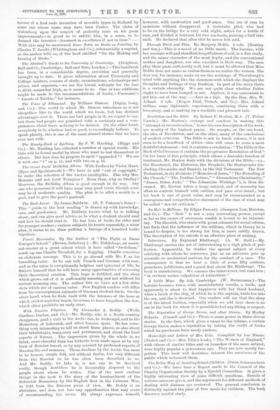Revelation and the Bible. By Robert F. Horton, M.A. (T.
Fisher Ilnwin.)—Mr. Horton's courage and candour in making this "attempt at reconstruction," to use his own description of his work, are worthy of the highest praise. He accepts, on the one hand, the idea of Revelation, and on the other, many of the conclusions of modern criticism. The Bible is not to teach science, it is not even to be a handbook of ethics—this will seem to some a most doubtful statement—but it contains a revelation : "The Bible is the Book of God because it contains the progressive Revelation of Gel', On the basis of this principle, which allows a desirable freedom of treatment, Mr. Horton deals with the divisions of the Bible,—e.g., the Ilexateuch, the Histories, the Prophets, the Hagiographa (ex- cluding Chronicles and Daniel), in the Old Testament. The New Testament, in six divisions ("Memoirs of JEIBUS," "The Founding of the Church," The Pauline Letters," "Alexandrine Christianity," "James, Peter, Jude," " The Johannine Writings "), is then dis- cussed. Mr. Horton takes a large subject, and of necessity has often to content himself with outline, and pass over detail ; but his book is one of great value, and may be recommended as a courageous and comprehensive statement of the case of what may be called " devout criticism."


















































 Previous page
Previous page